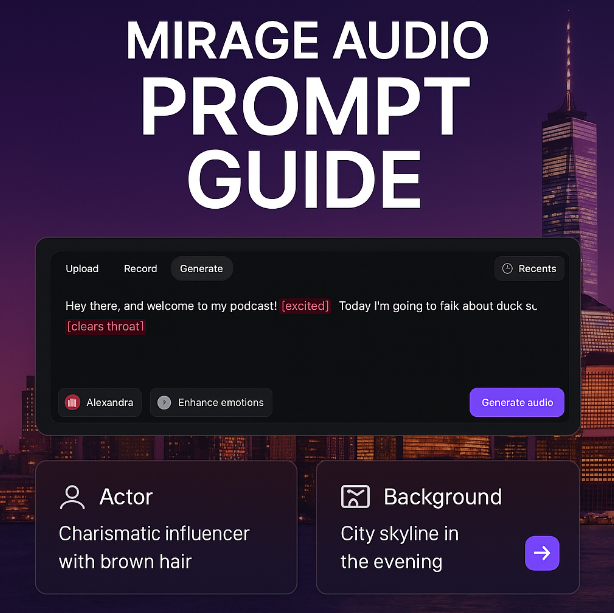If you decide to generate audio for your Mirage Studio project, you can write prompts that can make realistic, expressive narrations. When writing a prompt, you can use these elements to adjust the expressions of your actor’s voice:
- Punctuation marks
- Words written in all capital letters
- Expression marks
Use Punctuation Marks
You can use punctuation marks to adjust the pace and tone of your actor. For example, using the exclamation mark (!) gives the narrator a more elevated pitch.
Using an ellipsis (...) allows you to make the tone a bit more relaxed and low-pitch, with slight pauses in between.
As for other punctuation marks:
- Comma (,) makes brief pauses, separates items or clauses
- Question mark (?) makes rising intonation, questioning tone
- Semicolon (;) makes longer pause than comma, connects related thoughts
- Colon (:) makes anticipatory pause
An example sentence:
Hey there, and welcome to my podcast! Today I’m going to talk about duck soaps…
All Capital letters
Words written in all capital letters have elevated pitch. If you want to put an emphasis on a specific word in the audio, you can write it in all caps.
An example sentence:
Hey there, and welcome to my podcast. Today I’m going to talk about DUCK SOAPS.
Expression marks
With the help of Elevenlabs’ new expressive model, you can use expression marks to adjust the expressions of your actor. For example, using [curious] makes the actor have a curious tone, or [clears throat] makes the actor clear her throat!
This can be flexible and support a wide range of different expressions.
An example sentence:
Hey there, and welcome to my podcast! [excited] Today I’m going to talk about duck soaps. [giggles]
Last modified on January 27, 2026
